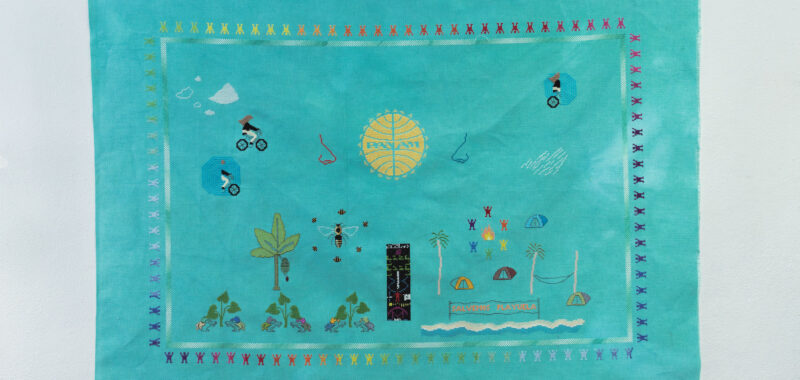SAN JUAN, Puerto Rico — Justo ahora (right now), María “Lulú” Varona’s second solo show at Embajada gallery, presents cross-stitched and embroidered works that meditate on local concerns such as femicide and environmental destruction, affirming the political potential of solidarity.
Varona’s works are often enclosed by a porous chain of multicolor shapes that recall human figures, suggesting the necessity of collectivity in overcoming common struggles. In “Sin amor no hay revolución” (Without love there is no revolution), for instance, the artist references bodies of water at risk due to corporate interests and human exploitation: A banner reading “Salvemos Playuela” (Let’s Save Playuela) invokes the ecologically rich region of the island nation, and sandy coastlines are joined by silhouettes of baby turtles as well as figures gathered around a campfire.
Meanwhile, “Agroecologíapr.com I” and “Agroecologíapr.com II” speak to the grassroots movement to shift away from sole dependency on United States imports and toward independent farming to support the archipelago’s population, which has grown in the past six years. The work depicts a proliferation of flowers, a queen bee flying under the sun, and figures tending to the soil, harking back to farming practices that predate the United States’s destruction of native crop industries in the 20th century in much the same way that Varona’s sewing practice preserves and cultivates artisanal traditions that predate US intervention.

“Cuanto más” (How many more) differs from other works in this show in that it feels more like a call to action. In the work, various figures carry picket signs; two hold up a green bandana, symbolizing the Campaña Nacional por el Derecho al Aborto Legal, Seguro y Gratuito (National Campaign for the Right to a Legal, Safe and Free Abortion) based in Argentina. She excludes the chain of figurines from this work, emphasizing the work that needs to be done to achieve the camaraderie and peace that border suggests. Varona’s portrayal of protests draws attention to the alarming amount of femicides in Puerto Rico, an issue that continues to foment frustration and distrust in the government.
Because Varona scatters symbols and objects throughout her canvases at various scales and perspectives, her compositions recall the visually playful floating landscapes of handheld video games like Zelda or Pokémon. Indeed, Varona inserts herself into them not as a main character, but as someone who bears witness to these issues. Her avatar bikes through every piece as if all were cut from the same cloth, alluding to the fact that the struggles depicted in all her compositions are entwined.



Justo ahora (right now) continues at Embajada (354 Cll Fernando Primero, San Juan) through August 24.

